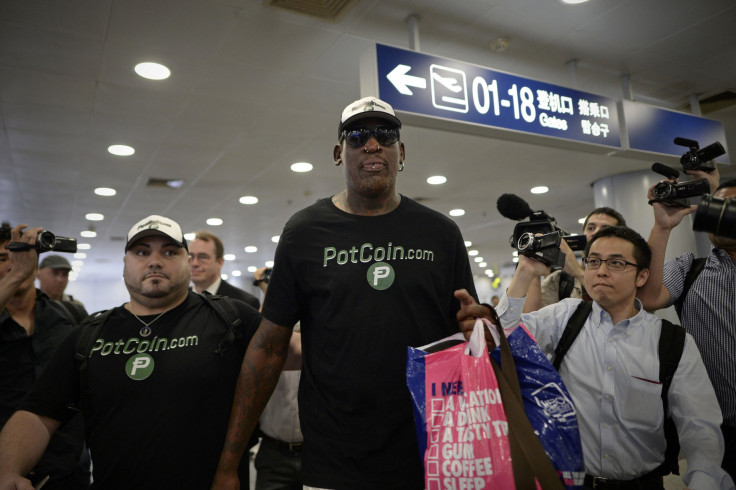Dennis Rodman In North Korea: Why Is Former NBA Player There And What's His History With Kim Jong Un?

Former NBA "bad boy" Dennis Rodman sparked international headlines Tuesday when he made yet another trip to North Korea. This marks the fifth time Rodman has visited the highly secretive communist country with many understandably curious as to why a retired basketball player has had more meetings with Kim Jong Un than any diplomat.
In recent days, Rodman has reportedly met with North Korean athletes and gifted the sports minister with a copy of President Trump's book "The Art of the Deal."
Rodman, who has forged a "friendship" with Kim, first visited North Korea in February 2013. He followed up the trip with visits in September and December 2013, as well as in January 2014, while being sponsored by Irish online betting company Paddy Power. Under pressure from human rights groups, Paddy Power stopped sponsoring Rodman's trip to Pyongyang.
"Given changed circumstances, Paddy Power has decided to withdraw its association with the Dennis Rodman basketball initiative in North Korea," Paddy Power said in a statement in December 2013.
This time around, Rodman is having his trip sponsored by PotCoin, a digital currency for marijuana. Rodman and his crew showed up at Beijing International Airport wearing PotCoin gear and surrounded by cameras.
Before his trip, Rodman posted on Twitter: "Thank you PotCoin.com for sponsoring my mission. I'll discuss when I return." PotCoin, meanwhile, has seen a surge in attention from Rodman's trip.
Some have openly wondered what both Rodman and Kim stand to gain from his visits.
In March 2012 court documents in Orange County, California, Rodman's attorney, Linnea Willis, claimed Rodman was not only broke but also "extremely sick," and financially unable to pay child and spousal support payments.
Rodman's visit to North Korea also coincides with the recent release of 22-year-old Otto Warmbier, who was sentenced to 15 years in prison with hard labor in January 2016. Warmbier returned from North Korea in a coma and has a severe brain injury, according to doctors.
On Thursday, Warmbier's father, Fred Warmbier, addressed a Cincinnati crowd and referenced Rodman's visit.
"Dennis Rodman had nothing to do with Otto," he said. "It's a diversion ... this is all planned."
The State Department also apparently has nothing to do with Rodman's North Korea trip, as it has denied that he is serving in any emissary role for the president. Though Rodman endorsed Trump in July 2015 and appeared on two seasons of Trump's reality game show, "Celebrity Apprentice," he has confirmed his visit has nothing to do with the president.
Crazy Dennis Rodman is saying I wanted to go to North Korea with him. Never discussed, no interest, last place on Earth I want to go to.
— Donald J. Trump (@realDonaldTrump) May 8, 2014
As for Kim, his interest in meeting with Rodman likely stems from his interest in the Chicago Bulls, a team that won three titles with Rodman and Michael Jordan in the late 1990s. In June 2013, Adam Johnson wrote in GQ that a Japanese sushi chef introduced Kim to VHS tapes of Bulls playoff games.
Rodman's visits haven't been Kim's only brush with the Bulls. In October 2000, U.S. Secretary of State Madeleine Albright presented North Korean leader Kim Jong Il, Kim's father, with an NBA basketball signed by Jordan. A year after Albright's visit, North Korea extended a formal invitation for Jordan to visit. Jordan would decline and it appears Rodman might have been the next best player willing to make the trip.
But can anything be accomplished through "basketball diplomacy?" In the early 1970s, the U.S. table tennis team visited China, paving the way for President Richard Nixon to travel there in 1972 to help normalize relations.
Aside from a posting on Twitter that asked Kim to do him "a solid" and release Kenneth Bae, a South Korea-American missionary imprisoned on charges of planning to overthrow North Korea, Rodman has seemingly done little to strengthen relations between the authoritarian state and the rest of the world.
"My purpose is to actually see if I can keep bringing sports to North Korea. So that's the main thing," Rodman told reporters in Beijing.
The timing might be right for Rodman to do more than just strengthen sports in North Korea.
Tensions have run high between Washington and Pyongyang in recent months, with Secretary of State Rex Tillerson stating in April that failure to limit North Korea's nuclear capabilities could lead to "catastrophic consequences." U.N. Secretary General Antonio Guterres and foreign affairs ministers also expressed concern about North Korea’s nuclear ambitions.
"The absence of communication channels with the DPRK (North Korea) is dangerous," Guterres told the 15-member Security Council. "We need to avoid miscalculation and misunderstanding. We need to act now to prevent conflict and achieve sustainable peace."
© Copyright IBTimes 2024. All rights reserved.






















